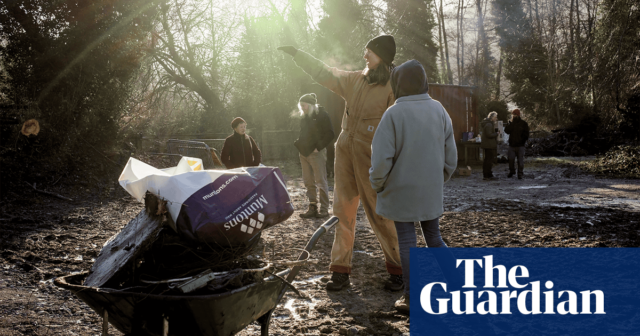In the village of Thrupp, where houses are spread out over steep winding roads in the narrow Frome Valley, it’s difficult for lorries to get through to collect garden waste.
It leaves some residents with the choice of lengthy car trips to a nearby town to take their green waste to a facility, or burning their rubbish in small bonfires that have prompted many irate social media posts.
“The system we have in place currently isn’t very good for our neighbourhood,” said Shelley Tester, a director of Brimscombe and Thrupp Community Composters (Batcom), which has been working to find a local – and more sustainable – solution to the problem.
Soon, residents will be able to bring their garden waste down to a community composting site in the village, where it will be turned into bags of compost that members of the scheme can then take away to enrich their soil at home.
“Because we’re all on a hill and a lot of us live on country lanes, people have these big brown wheelie bins for their garden waste but that’s only fine if the lorry can access you,” Tester said.
“But even then there’s the added environmental impact of taking tonnes of green waste and driving it miles away. Whereas if you’ve got local green waste that’s coming just down the hill, there’s no transportation costs, there’s no carbon. People have a really valuable product at the end of it – it just closes that loop.”
It has been years in the planning, but their site at Hope Mill is almost complete, and will soon have six large composting bays with the capacity to make at least 150 tonnes of compost a year.
It will be managed by Batcom, a community benefit society owned by anyone in Brimscombe and Thrupp who buys a £1 share.
“I live just a two-minute wheelbarrow away from here. At the moment I have to drive 15-20 minutes to Horsley to take my garden waste, but now I’ll be able to just literally put it in a wheelbarrow and bring it down. That would be amazing,” said Kate Cole, another member of the Batcom team, who works in waste services for a local council.
With councils across the country struggling to stay afloat, garden waste services are often one of the first to be stripped back, and many that were previously free now require an annual fee.
It’s one of the reasons why community composting projects are springing up, everywhere from inner-city neighbourhoods to schools, small businesses and community centres.
The idea is simple – to collect and recycle organic materials locally and sustainably in a way that responds to the needs of the local community and helps reduce waste and carbon emissions.
“I think more and more local communities understand that there’s a need for sustainable action, but it can be really difficult to know how to do that on an individual level,” said Misha Dhanak, the CEO of Spacehive, the community crowdfunding platform through which Batcom raised cash for their project.
“That’s why projects like this do so well. They’ve identified a real local issue and come up with a solution but not only that, [they have managed to] bring the community together around it and rally everyone in a way that got people energised. People feel a sense of ownership.”
The local parish council donated £15,700, as well as the land, to help get the composting site off the ground, and the group went on to raise £26,060 via Spacehive last year.
“It’s really exciting, now that the bays are in and you can visualise what it’ll look like. We’re going to start collecting materials in March, and the day that the shredder comes on site is going to be great,” said Cole.
Residents will bring their waste to the site, where it will be sorted into categories: high-nitrogen type waste such as grass cuttings and weeds, and then rough, wood-type material that can be shredded.
This will be mixed together to form the basis of the compost, before it’s transferred to a bay where it will heat up for a few days. Once it’s cooled, it will be turned into the next bay where the introduction of more oxygen will cause it to heat up again, speeding up the decomposition process to produce the final product.
“In the middle of summer we could be taking several tonnes of green waste and turning that into compost within a number of weeks,” said Tester, adding that the group were thrilled with how quickly they raised the funds to get the site ready.
In the future they also hope to host educational workshops on the site with local schoolchildren.
“Community resilience and empowerment, the circular economy, all those things are represented here,” said Greg Pilley, a Batcom director. “But there’s also a connection to health and wellbeing, the recognition that the biome in the soil is also the biome in your guts, basically. You can see our whole lives represented in what we’re doing here.”






